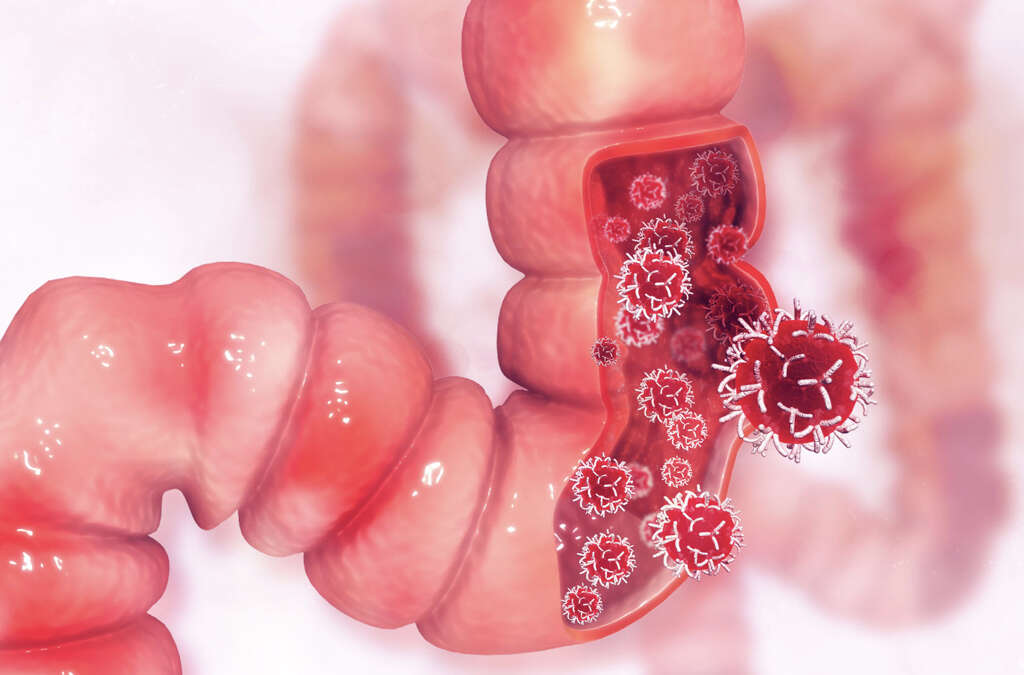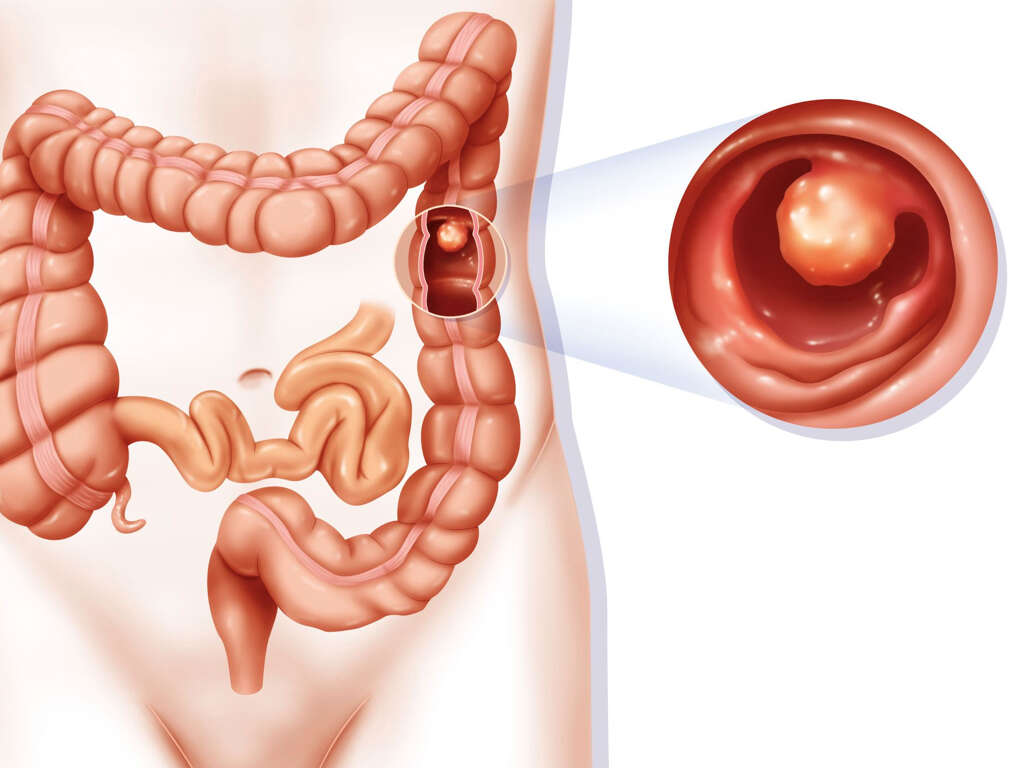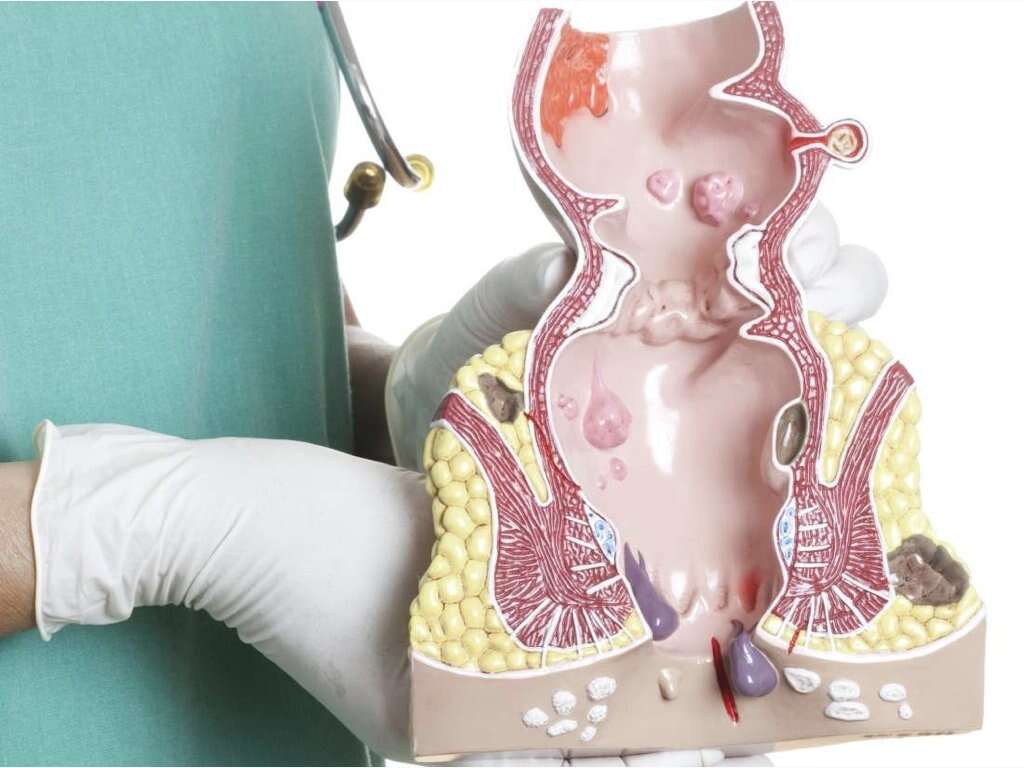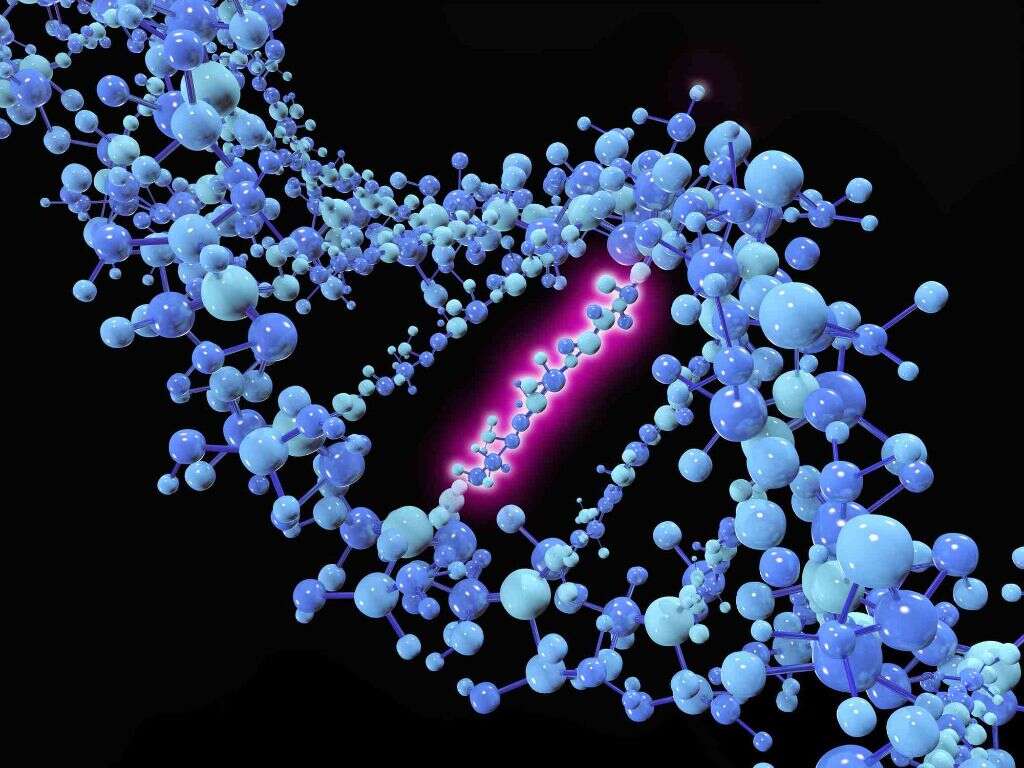What Is Lynch Syndrome?
 Article Sources
Article Sources
- 1. Bhattacharya P, McHugh TW. “Lynch Syndrome”. StatPearls. StatPearls Publishing, (2019). https://www.ncbi.nlm.nih.gov/books/NBK431096/
- 2. Munoz, Juan C. et al. “Hereditary Nonpolyposis Colorectal Cancer” Medscape: Drugs & Diseases (2017). https://emedicine.medscape.com/article/188613-overview
- 3. Strafford, J. Craig. “Genetic Testing for Lynch Syndrome, an Inherited Cancer of the Bowel, Endometrium, and Ovary” Rev Obstet Gynecol. 2012; 5: 42–49 https://www.ncbi.nlm.nih.gov/pmc/articles/PMC3349923/
Lynch syndrome is an inherited form of colorectal, endometrial, and ovarian cancers.2Munoz, Juan C. et al. “Hereditary Nonpolyposis Colorectal Cancer” Medscape: Drugs & Diseases (2017). https://emedicine.medscape.com/article/188613-overview While the average person has a 2% chance of developing cancer of the colon, the mutations associated with this condition increases the chance to 70 to 80%.3Strafford, J. Craig. “Genetic Testing for Lynch Syndrome, an Inherited Cancer of the Bowel, Endometrium, and Ovary” Rev Obstet Gynecol. 2012; 5: 42–49 https://www.ncbi.nlm.nih.gov/pmc/articles/PMC3349923/
Henry T. Lynch first described the condition in 1966 after treating a family whose various members had colorectal cancer, as well as tumors in the stomach and endometrium.2Munoz, Juan C. et al. “Hereditary Nonpolyposis Colorectal Cancer” Medscape: Drugs & Diseases (2017). https://emedicine.medscape.com/article/188613-overview
1. Types of Lynch Syndrome
Two types of Lynch syndrome exist. The same genetic mutations are responsible for both, but the difference lies in their manifestations. Lynch syndrome I refers to the condition experienced by those with inherited colon cancer.2Munoz, Juan C. et al. “Hereditary Nonpolyposis Colorectal Cancer” Medscape: Drugs & Diseases (2017). https://emedicine.medscape.com/article/188613-overview
Patients with Lynch syndrome II have primary cancers of the gastrointestinal tract or reproductive system,2Munoz, Juan C. et al. “Hereditary Nonpolyposis Colorectal Cancer” Medscape: Drugs & Diseases (2017). https://emedicine.medscape.com/article/188613-overview with approximately half of women experiencing endometrial cancer first. Their risk of ovarian cancer is increased from the normal 1% to 10 to 15%.3Strafford, J. Craig. “Genetic Testing for Lynch Syndrome, an Inherited Cancer of the Bowel, Endometrium, and Ovary” Rev Obstet Gynecol. 2012; 5: 42–49 https://www.ncbi.nlm.nih.gov/pmc/articles/PMC3349923/
2. Occurrence
Colorectal cancer is the third most common type of cancer in the United States, with Lynch syndrome responsible for 1 out of 35 cases. Men and women are equally likely to have the condition,2Munoz, Juan C. et al. “Hereditary Nonpolyposis Colorectal Cancer” Medscape: Drugs & Diseases (2017). https://emedicine.medscape.com/article/188613-overview with an average age at diagnosis of 44 to 61 years,1Bhattacharya P, McHugh TW. “Lynch Syndrome”. StatPearls. StatPearls Publishing, (2019). https://www.ncbi.nlm.nih.gov/books/NBK431096/ compared to age 60-65 for other causes.2Munoz, Juan C. et al. “Hereditary Nonpolyposis Colorectal Cancer” Medscape: Drugs & Diseases (2017). https://emedicine.medscape.com/article/188613-overview
Lynch syndrome is the most common type of inherited endometrial cancer3Strafford, J. Craig. “Genetic Testing for Lynch Syndrome, an Inherited Cancer of the Bowel, Endometrium, and Ovary” Rev Obstet Gynecol. 2012; 5: 42–49 https://www.ncbi.nlm.nih.gov/pmc/articles/PMC3349923/, responsible for 1 out of 50 cases in the U.S. Forty-seven thousand women are diagnosed each year,3Strafford, J. Craig. “Genetic Testing for Lynch Syndrome, an Inherited Cancer of the Bowel, Endometrium, and Ovary” Rev Obstet Gynecol. 2012; 5: 42–49 https://www.ncbi.nlm.nih.gov/pmc/articles/PMC3349923/ with an average age at diagnosis of 48 to 62 years.1Bhattacharya P, McHugh TW. “Lynch Syndrome”. StatPearls. StatPearls Publishing, (2019). https://www.ncbi.nlm.nih.gov/books/NBK431096/ Men and women of Asian descent are more likely to develop gastric cancer as a result of Lynch syndrome.2Munoz, Juan C. et al. “Hereditary Nonpolyposis Colorectal Cancer” Medscape: Drugs & Diseases (2017). https://emedicine.medscape.com/article/188613-overview

3. Causes
Adenomas, tumors in the epithelial tissue of the colon, begin as benign growths that gradually turn cancerous due to errors in DNA replication. In most people, this process takes many years. The genetic mutations involved in Lynch syndrome instead cause the cells to turn cancerous within two to three years.2Munoz, Juan C. et al. “Hereditary Nonpolyposis Colorectal Cancer” Medscape: Drugs & Diseases (2017). https://emedicine.medscape.com/article/188613-overview
The body naturally repairs errors in its own DNA with mismatch repair proteins. In people with Lynch syndrome, however, the genes that code for these proteins contain a mutation.3Strafford, J. Craig. “Genetic Testing for Lynch Syndrome, an Inherited Cancer of the Bowel, Endometrium, and Ovary” Rev Obstet Gynecol. 2012; 5: 42–49 https://www.ncbi.nlm.nih.gov/pmc/articles/PMC3349923/ Researchers have identified seven mutated genes in all and believe that more exist.2Munoz, Juan C. et al. “Hereditary Nonpolyposis Colorectal Cancer” Medscape: Drugs & Diseases (2017). https://emedicine.medscape.com/article/188613-overview
4. Symptoms
All forms of colon cancer begin with the development of polyps in the intestines during a person’s 20s and 30s. Lynch syndrome is also known as nonpolyposis colorectal cancer because it results from fewer than 100 polyps, compared to the large number in other types of colorectal cancer.2Munoz, Juan C. et al. “Hereditary Nonpolyposis Colorectal Cancer” Medscape: Drugs & Diseases (2017). https://emedicine.medscape.com/article/188613-overview
As the polyps grow, they may cause constipation or diarrhea or stool that is black and tarry or contains blood. Patients may suffer from abdominal pain, cramping, or a heavy, bloated feeling. They may lose interest in food, lose weight, or feel weak. Sometimes they become anemic for no apparent reason.2Munoz, Juan C. et al. “Hereditary Nonpolyposis Colorectal Cancer” Medscape: Drugs & Diseases (2017). https://emedicine.medscape.com/article/188613-overview

5. Associated Conditions
People who have inherited the genes for Lynch syndrome are at risk for other cancers, in addition to colorectal cancer. These include cancers of the ovary, stomach, pancreas, bladder, prostate, brain, skin, hepatobiliary tract, and other regions. By age 70, the risk of endometrial cancer is 30-40% and 9-12% for ovarian cancer.2Munoz, Juan C. et al. “Hereditary Nonpolyposis Colorectal Cancer” Medscape: Drugs & Diseases (2017). https://emedicine.medscape.com/article/188613-overview
Turcot syndrome is the name given to the condition of having colorectal polyps in association with a brain tumor. Doctors once thought it to be a separate condition but now know the mutations causing Lynch syndrome are to blame. Muir-Torre syndrome involves tumors and carcinomas of the sebaceous glands, accompanying typical features of Lynch syndrome.2Munoz, Juan C. et al. “Hereditary Nonpolyposis Colorectal Cancer” Medscape: Drugs & Diseases (2017). https://emedicine.medscape.com/article/188613-overview
6. Screening
Colonoscopy is the most common type of screening performed for those with a family history of colon cancer. The American Cancer Society recommends a colonoscopy every five years, beginning at age 40 or 10 years before the age at which a family member was diagnosed. Those at high risk can opt for a screening every one to two years.2Munoz, Juan C. et al. “Hereditary Nonpolyposis Colorectal Cancer” Medscape: Drugs & Diseases (2017). https://emedicine.medscape.com/article/188613-overview
Women with Lynch syndrome should undergo regular checks for cancers of the reproductive system. These screenings potentially include ultrasounds, biopsies of the uterine lining, and endometrial aspiration. Experts recommend that patients at risk for cancer of the urinary tract regularly undergo ultrasonography, cystoscopy, and urinary cytology beginning at age 30.2Munoz, Juan C. et al. “Hereditary Nonpolyposis Colorectal Cancer” Medscape: Drugs & Diseases (2017). https://emedicine.medscape.com/article/188613-overview

7. Heritability
Because the gene that causes Lynch syndrome is autosomal dominant, children with one affected parent have a 1 in 2 chance of inheriting the gene and a 70 to 80% lifetime risk of colon cancer. If the parent developed cancer before age 45 or if two close relatives have the condition, the risk of cancer is four to six times greater.2Munoz, Juan C. et al. “Hereditary Nonpolyposis Colorectal Cancer” Medscape: Drugs & Diseases (2017). https://emedicine.medscape.com/article/188613-overview
It is also possible to develop Lynch syndrome without having inherited the condition. Some people have spontaneous genetic mutations that affect them directly or that they pass on to the next generation.2Munoz, Juan C. et al. “Hereditary Nonpolyposis Colorectal Cancer” Medscape: Drugs & Diseases (2017). https://emedicine.medscape.com/article/188613-overview
8. Prognosis
The five-year survival rate of patients who develop colorectal cancer from Lynch syndrome is 60%, compared to 40 to 50% in those who develop the cancer from other causes. A 15-year study of 22 families showed that regular screenings improve survival significantly.2Munoz, Juan C. et al. “Hereditary Nonpolyposis Colorectal Cancer” Medscape: Drugs & Diseases (2017). https://emedicine.medscape.com/article/188613-overview
Patients who do not have surgery to remove at least part of the colon after the first cancerous growth is detected have a 30 to 40% risk of developing another tumor within 10 years and a 50% risk of developing one within 15 years. This rate is much higher than in other people, who only have a 5% risk of a second cancer within 15 years.2Munoz, Juan C. et al. “Hereditary Nonpolyposis Colorectal Cancer” Medscape: Drugs & Diseases (2017). https://emedicine.medscape.com/article/188613-overview

9. Diagnosis
The first step in diagnosing Lynch syndrome is to review a patient’s family history of cancer.2Munoz, Juan C. et al. “Hereditary Nonpolyposis Colorectal Cancer” Medscape: Drugs & Diseases (2017). https://emedicine.medscape.com/article/188613-overview If the family meets certain criteria, laboratory technicians examine tumors for evidence of MMR gene mutations. The tissue of Lynch syndrome tumors has a distinctive appearance that aid in diagnosis.3Strafford, J. Craig. “Genetic Testing for Lynch Syndrome, an Inherited Cancer of the Bowel, Endometrium, and Ovary” Rev Obstet Gynecol. 2012; 5: 42–49 https://www.ncbi.nlm.nih.gov/pmc/articles/PMC3349923/
A blood test can determine whether a person carries the mutations that cause Lynch syndrome. Some doctors are reluctant to order genetic tests since they are expensive and not required to diagnose the disease.2Munoz, Juan C. et al. “Hereditary Nonpolyposis Colorectal Cancer” Medscape: Drugs & Diseases (2017). https://emedicine.medscape.com/article/188613-overview Others recommend this type of screening, however, citing improvement of outcomes.3Strafford, J. Craig. “Genetic Testing for Lynch Syndrome, an Inherited Cancer of the Bowel, Endometrium, and Ovary” Rev Obstet Gynecol. 2012; 5: 42–49 https://www.ncbi.nlm.nih.gov/pmc/articles/PMC3349923/
10. Treatment
Colectomy is the recommended treatment for colorectal cancer in patients with Lynch syndrome. After removing the colon, surgeons then either join the small intestine to the rectum, create an internal pouch to take the place of the colon, or create an opening in the abdomen for waste to exit the body.2Munoz, Juan C. et al. “Hereditary Nonpolyposis Colorectal Cancer” Medscape: Drugs & Diseases (2017). https://emedicine.medscape.com/article/188613-overview
Some experts recommend removing the colon as a preventative measure, even before cancer develops. Others think this treatment is unnecessary in 15-20% of patients and claim that the procedure does not stop cancer from developing in adjacent areas.2Munoz, Juan C. et al. “Hereditary Nonpolyposis Colorectal Cancer” Medscape: Drugs & Diseases (2017). https://emedicine.medscape.com/article/188613-overview Researchers are currently studying the use of nonsteroidal anti-inflammatory drugs to reduce cancer risk.1Bhattacharya P, McHugh TW. “Lynch Syndrome”. StatPearls. StatPearls Publishing, (2019). https://www.ncbi.nlm.nih.gov/books/NBK431096/










